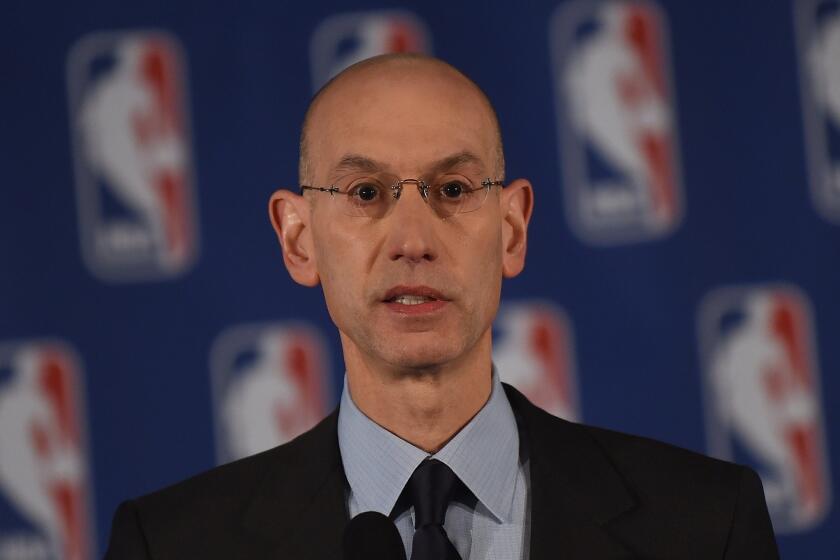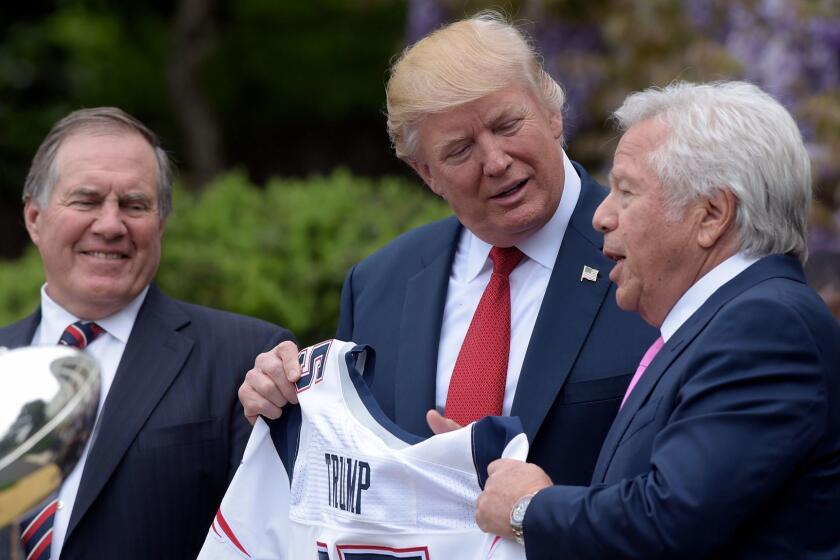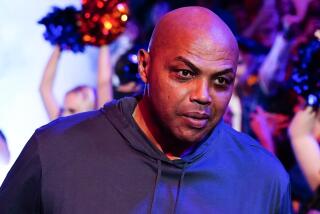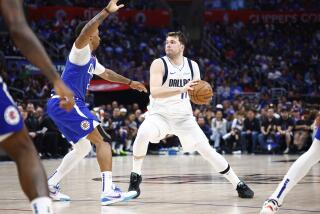Column: In caving to the Chinese, the NBA reminds everyone that it’s a business like any other
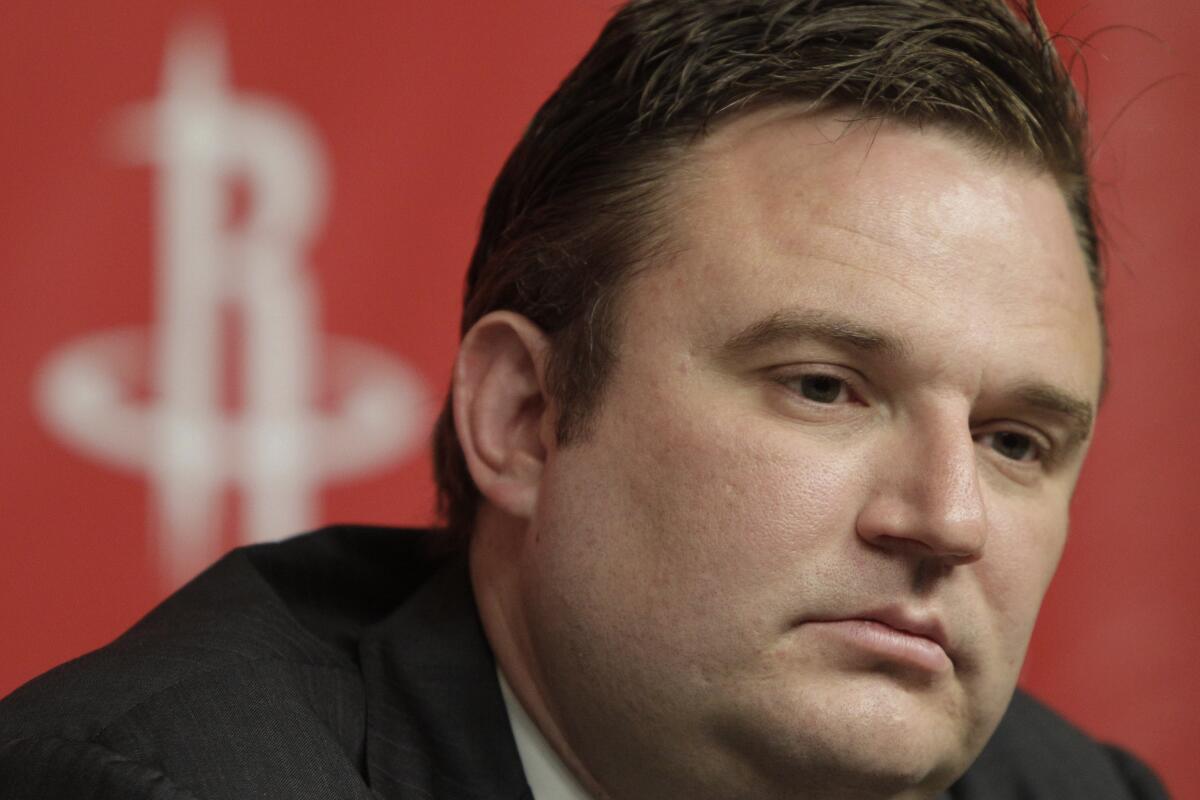
- Share via
Fans, pundits, free speech advocates, even members of Congress have been piling on the National Basketball Assn. for its craven genuflection to the Chinese government over a tweet Friday by Houston Rockets general manager Daryl Morey.
Morey’s tweet expressed solidarity with the Hong Kong protesters who have bedeviled Beijing for months. The tweet read, “Fight for Freedom. Stand with Hong Kong.” It has since been deleted, leaving in its wake increasingly abject backpedaling by Morey, his team owner and the league itself.
All this chatter in public statements and follow-up tweets has amounted, in its way, to a public service. It reminds us that for all its posturing as a principled force for diversity and human rights, the NBA is a business like any other.
There is no doubt, the economic impact is already clear.
— NBA Commissioner Adam Silver
In business, money talks, principle walks. Best not to forget that, ever.
This isn’t the first time that an American business has caved to the sensitivities of the Chinese. Hollywood has edited movies to correspond to the demands of Chinese culture and the Chinese government. Apple and Google have both reportedly removed apps or blocked websites from its platforms at government insistence.
The Morey episode already has cost the NBA brand in China. “There is no doubt, the economic impact is already clear,” NBA Commissioner Adam Silver said in Japan, the site of an international exhibition game.
Chinese business institutions have cut ties with the Rockets, which have been the second-most popular team in the rapidly growing Chinese market, due in part to the role of former Rockets star Yao Ming, currently chairman of the Chinese Baskeball Assn. (More on that in a moment.)
In the longer term, it’s likely to cost the league considerable coin in reputation. The NBA has long held itself out as a paragon of public sensitivity.
This is the league, after all, that summarily ejected Donald Sterling as owner of the Los Angeles Clippers after a recording of his racist statements became public. In 2016, when North Carolina passed a law that openly discriminated against LGBTQ people, the league struck Charlotte from the roster of cities eligible to host its All-Star Game until the law was changed.
The NBA’s tolerant approach to public political displays by its players and executives has stood in contrast to the National Football League, which has effectively blackballed former star quarterback Colin Kaepernick for kneeling during the pre-game playing of the national anthem, and tied itself into knots to surrender to President Trump’s denunciation of Kaepernick and other players following his lead.
We now know where the National Basketball Assn. draws the line.
Silver tried to express his league’s commitment to free speech over the weekend. “As a values-based organization that I want to make it clear...that Daryl Morey is supported in terms of his ability to exercise his freedom of expression,” he said in Tokyo. Yet actions will speak louder than words.
It’s worth noting that the NBA’s actions in the Sterling and Charlotte cases weren’t all that pure. Sterling’s racism had been no secret for much of the 30 years he reigned as an NBA team owner. North Carolina didn’t repeal its infamous “bathroom bill,” but changed it just enough to mollify the league and other critics. (The All-Star Game was held in Charlotte this year.)
What motivated the league’s response in both cases was money -- inaction threatened to cost the league more than action would.
The power of economics is displayed even more overtly in the China affair. But let’s first recap what’s been happening.
First out of the box with an apology tweet was Houston Rockets owner Tilman Fertitta, who wrote, “Listen...@dmorey does NOT speak for the @HoustonRockets.” Morey himself followed two days later with a tweet stating, “I did not intend my tweet to cause any offense to Rockets fans and friends of mine in China. I was merely voicing one thought, based on one interpretation, of one complicated event.” He said he’s had a chance since the original tweet “to hear and consider other perspectives.”
The NBA issued a statement Sunday offering its recognition that Morey’s views “have deeply offended many of our friends and fans in China, which is regrettable.” The version posted on the league’s Chinese-language website, however, was rather more abject. According to a translation by the Associated Press, it said the league was “extremely disappointed” by Morey’s “inappropriate” tweet and acknowledged that the tweet “severely hurt the feelings of Chinese fans.”
While football fans and labor experts ponder whether Colin Kaepernick found a smoking gun to bolster his collusion case against the National Football League, the still-unemployed quarterback is pointing to a central figure in the case: President Trump.
Why is the China market so important to the NBA? For one thing, it’s huge. The league’s account on Weibo, the leading Chinese social media platform, has 33 million followers, according to the South China Morning Post. That’s roughly 5 million more than its Twitter account.
The NBA has long touted its popularity in the Chinese market. In 2017-18, the league says, more than 600 million Chinese TV viewers watched NBA events. In July, the league announce a five-year extension of its digital distribution deal with the Chinese company Tencent Holdings. The value of the deal wasn’t announced, but it’s been estimated to be worth $700 million to $1.5 billion.
All that has been thrown into question, at least for the moment, by the Morey controversy. For the most part, China’s punitive measures have been aimed chiefly at the Rockets. The Chinese Basketball Assn. said it would “suspend exchanges and cooperation” with the club.
CCTV 5, China’s leading sports channel, said it would drop Houston Rockets games. Tencent said it would “suspend the Rockets’ live broadcast and news reports,” and informed customers who follow the Rockets that it would help them to transfer their following to other teams.
Commercial sponsors, including the Li-Ning sportswear company and Shanghai Pudong Development Bank each said over the weekend that they would suspend cooperation with the team. “The dignity of the motherland is above all else, and the sovereignty of the motherland cannot be challenged!” read a statement from the bank. This is the hazard of doing business in a country where the government holds such powerful sway, including ownership interests, in commercial enterprises.
The NBA plainly can survive the controversy by following a long-accepted playbook: distance itself from the perpetrator and redouble its expressions of admiration for the all-powerful regime. But statements like Silver’s, honoring the league’s commitment to “freedom of expression,” can’t help but ring a little hollower than they did just a few days ago.
More to Read
Inside the business of entertainment
The Wide Shot brings you news, analysis and insights on everything from streaming wars to production — and what it all means for the future.
You may occasionally receive promotional content from the Los Angeles Times.

